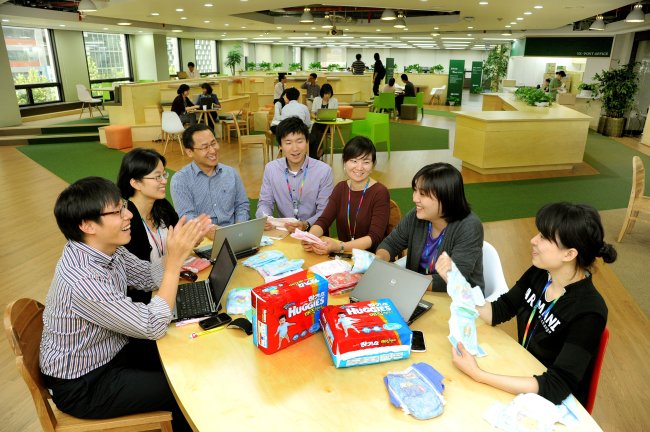[Weekender] Flexible working hours key for family-friendly workplace
Workers find it hard to take advantage of company policies
By Korea HeraldPublished : May 30, 2014 - 21:15
A growing number of South Korean companies are taking initiatives to create a family-friendly environment to retain talented employees, but severe lack of time remains a problem for working parents in a country notorious for long working hours.
“I sleep three hours a day to take care of my two kids,” Kim Hyun-kyung, a 31-year-old working mom, told The Korea Herald as she walked out of her office at 5 p.m.
She was in a rush, heading to two day care centers to pick up her kids, a 2-year-old girl and a 5-year-old boy.
Kim and her husband, who both work at the leading hygiene products maker Yuhan-Kimberly, decided to use the company’s flexible working hour policy so that she can start and finish work one hour earlier than the standard 9-to-6 workday.
Along with the flexible hour system, Yuhan-Kimberly implements several family-friendly management measures. The company operates a breast-feeding room for staff and conducts a survey on its employees’ engagement with their family to find out their needs every two years.
“I sleep three hours a day to take care of my two kids,” Kim Hyun-kyung, a 31-year-old working mom, told The Korea Herald as she walked out of her office at 5 p.m.
She was in a rush, heading to two day care centers to pick up her kids, a 2-year-old girl and a 5-year-old boy.
Kim and her husband, who both work at the leading hygiene products maker Yuhan-Kimberly, decided to use the company’s flexible working hour policy so that she can start and finish work one hour earlier than the standard 9-to-6 workday.
Along with the flexible hour system, Yuhan-Kimberly implements several family-friendly management measures. The company operates a breast-feeding room for staff and conducts a survey on its employees’ engagement with their family to find out their needs every two years.

It also has an on-site day care center at its Daejeon factory where it can accommodate all its employees who wish to use it.
A growing number of public and private enterprises are making efforts to help their employees achieve balance between work and life as a way to tackle the social costs incurred by the exodus of professional women after giving birth and to attract talented people to the company.
According to the Ministry of Gender Equality and Family, a total of 552 companies have been certified as family-friendly workplaces, including small and medium enterprises and public organizations, since the ministry first introduced a certification system in 2008.
From designating a “family day” once a week to providing educational subsidies for employees and their families, many firms have family-friendly management practices that suit each company’s situation.
Samsung Fire & Marine Insurance shuts down its computer servers at 6 p.m. sharp every Wednesday and encourages its employees to leave the office to spend more time with their family.
“We launched the campaign mainly in order to enhance productivity. Working late hampers creativity and increases fatigue. Overall, the system boosts morale as employees can spend more time with their family and for themselves,” an official of the company’s human resources department said.
Cheil Worldwide, a marketing agency, runs an employee counseling center named Hyu, which runs on an annual budget of 70 million won ($69,000).
The center provides counseling programs tailored to each staff member, especially working parents with their first child, who are vulnerable to stress and are still learning childrearing techniques.
KBS Job, a call center for financial firms, witnessed an actual boost in productivity after expanding its welfare system for working parents.
The number of successful calls increased by 29 percent after the agency built an on-site child care center in Chuncheon, Gangwon Province.
Some 70 children attend the child care center, which can accommodate more than 85 children.
The number of working mothers leaving the company dropped significantly as well.
When working moms were asked what they really need, they had the same answer: “Time and a reliable caregiver.”
“During pregnancy what you need is financial support, such as (for) prenatal test fees. But after the baby is born, time is more important,” said Yim Hyun-joo, who is currently on six-month parental leave.
Under the Labor Standards Act, all working women in Korea are entitled to 90 days of maternity leave, with their wages for the first 60 days covered by the employer and the remaining 30 days by the government. They also are entitled to paid parental leave of up to one year, with 40 percent of their full-time wages covered by the employment insurance program, and their spouses may use parental leave as well.
In practice, however, few working fathers use the child care leave, for reasons ranging from economic ones to concerns over catching up with work and readjusting to the workplace atmosphere after returning.
Only 2,293 male workers took parental leave last year, only 3.3 percent of the total leave takers, according to data released by the Ministry of Employment and Labor.
Research by the Federation of Korea Trade Unions shows 89.6 percent of male worker respondents were willing to use the parental leave if they could.
The reality is harsh, as shown by the huge gap between nearly 90 percent of respondents who want to help their partners in raising children and the 3 percent who actually took advantage of the laws and regulations in place.
“While married working couples are very common, workplaces still stick to the old system built when men were the more dominant element in the labor force,” an official of the Korean Labor Institute said.
By Park Han-na (hnpark@heraldcorp.com)
-
Articles by Korea Herald


![[Exclusive] Korean military set to ban iPhones over 'security' concerns](http://res.heraldm.com/phpwas/restmb_idxmake.php?idx=644&simg=/content/image/2024/04/23/20240423050599_0.jpg&u=20240423183955)

![[Graphic News] 77% of young Koreans still financially dependent](http://res.heraldm.com/phpwas/restmb_idxmake.php?idx=644&simg=/content/image/2024/04/22/20240422050762_0.gif&u=)



![[Pressure points] Leggings in public: Fashion statement or social faux pas?](http://res.heraldm.com/phpwas/restmb_idxmake.php?idx=644&simg=/content/image/2024/04/23/20240423050669_0.jpg&u=)










